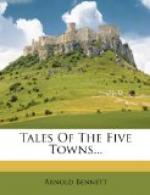* * * * *
TIDDY-FOL-LOL
It was the dinner-hour, and a group of ragged and clay-soiled apprentice boys were making a great noise in the yard of Henry Mynors and Co.’s small, compact earthenware manufactory up at Toft End. Toft End caps the ridge to the east of Bursley; and Bursley, which has been the home of the potter for ten centuries, is the most ancient of the Five Towns in Staffordshire. The boys, dressed for the most part in shirt, trousers, and boots, all equally ragged and insecure, were playing at prison-bars.
Soon the game ended abruptly in a clamorous dispute upon a point of law, and it was not recommenced. The dispute dying a natural death, the tireless energies of the boys needed a fresh outlet. Inspired by a common instinct, they began at once to bait one of their number, a slight youngster of twelve years, much better clothed than the rest, who had adventurously strolled in from a neighbouring manufactory. This child answered their jibes in an amiable, silly, drawling tone which seemed to justify the epithet ‘Loony,’ frequently applied to him. Now and then he stammered; and then companions laughed loud, and he with them. It was known that several years ago he had fallen down a flight of stone steps, alighting on the back of his head, and that ever since he had been deaf of one ear and under some trifling mental derangement. His sublime calmness under their jests baffled them until the terrible figure of Mr. Machin, the engine-man, standing at the door of the slip-house, caught their attention and suggested a plan full of joyous possibilities. They gathered round the lad, and, talking in subdued murmurs, unanimously urged him with many persuasions to a certain course of action. He declined the scheme, and declined again. Suddenly a boy shouted:
‘Thee dars’ na’!’
‘I dare,’ was the drawled, smiling answer.
‘I tell thee thee dars’ na’!’
‘I tell thee I dare.’ And thereupon he slowly but resolutely set out for the slip-house door and Mr. Machin.
Eli Machin was beyond doubt the most considerable employe on Clarke’s ‘bank’ (manufactory). Even Henry Clarke approached him with a subtly-indicated deference, and whenever Silas Emery, the immensely rich and miserly sleeping partner in the firm, came up to visit the works, these two old men chatted as old friends. In a modern earthenware manufactory the engine-room is the source of all activity, for, owing to the inventive genius of a famous and venerable son of the Five Towns, steam now presides at nearly every stage in the long process of turning earth into ware. It moves the pug-mill, the jollies, and the marvellous batting machines, dries the unfired clay, heats the printers’ stoves, and warms the offices where the ‘jacket-men’ dwell. Coal is a tremendous item in the cost of production, and a competent, economical engine-man can be sure




